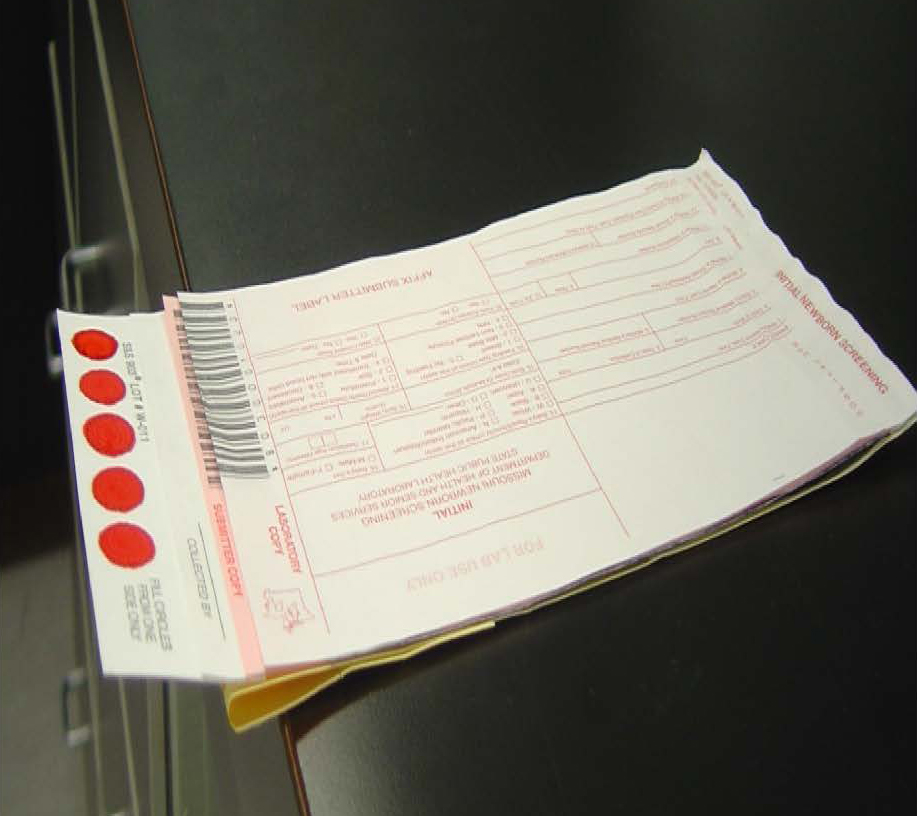Amino Acid Disorders
Brief Description
These metabolic disorders are caused by the body's inability to breakdown certain amino acids in proteins, or by the inability to detoxify the by-product of amino acids (ammonia) through the urea cycle. The buildup of amino acids and/or by-products of amino acid metabolism in the blood cause severe medical complications. Newborns identified to be at risk for an amino acid disorder are referred to a contracted medical center for diagnostic evaluation.
Laboratory Unit
Methodology
Tandem Mass Spectrometry (MSMS)
Specimen Collection
Missouri newborn screening samples must only be collected on the Food and Drug Administration (FDA) approved blood collection forms that must be pre-purchased from the MSPHL. The optimum collection time is between 24 and 48 hours-of-age. The instructions for collecting the samples are listed on the back of the collection form. All 5 circles on the filter paper need to be filled with blood from one side and then air dried for at least 3 hours in a horizontal position without allowing the blood to touch any surface during drying, including other parts of the card. (Example on the right)

Storage/Transport
Store the dried blood samples at room temperature in the envelopes provided by the MSPHL and transport within 24 hours of collection.
Acceptable Specimen Type(s)
Initial Screen (the red form) or Repeat Screen (the green form)
Test Request Form(s)
Included in kit
Possible Results
- Normal: The final newborn screening reports are mailed to the submitter and physician of record.
- Low Risk: Repeat the newborn screen. If, however, the infant is sick or displays signs of metabolic distress, the physician may wish to conduct diagnostic testing instead of, or in addition to the repeat screen. The final newborn screening reports are mailed to the submitter and physician of record.
- Moderate/High Risk: Diagnostic testing and consultation with a metabolic specialist is needed. Final results are phoned and faxed to physician/health care provider and appropriate follow up center. Follow up centers are contracted by the Department of Health and Senior Services for follow up tracking, testing, diagnosis, and counseling.
Interfering Substances
NICU Guidelines and Key for NBS
Specimen collection prior to 24 hours of age, prematurity, and illness can all affect the newborn screening results. “No Result” is reported on those specimens collected before 24 hours of age. TPN feeding can elevate several of the amino acids above the designated cutoffs. If the infant is on TPN, we ask that it be noted on the requisition form to help us reduce the reporting of false positive results. Not all TPN fed infants will get abnormal results, but if they do, we ask that a repeat newborn screening sample be collected 48 hours after the TPN has been discontinued.
Result Reported
1 to 3 working days after receipt of specimen
Fees
$130 charge - for full panel of screening disorders.
CPT Codes
83789
LOINC/SNOMED Codes
N/A
Additional Information
Prevalence of Disorder: 1:8,000 in Missouri
Feeding Effect: Protein feeding is helpful in detecting the condition as it challenges the metabolic pathways involved and causes the identifying markers to elevate above the normal cutoff levels allowing detection of the disorder. The optimum collection time for the newborn screening sample is between 24 and 48 hours after birth, and sufficient protein feeding has taken place by then. This includes TPN feeding, which contains amino acids.
Treatment: Treatment of these disorders is accomplished with dietary restriction of the offending amino acid(s) and sometimes medication. Urea cycle disorders will require treatment with low protein diets and medications to prevent hyperammonemia and remove toxic compounds. Infants with neonatal presentations of a urea cycle disorders represent medical emergencies and outcomes may be variable. These patients typically require aggressive treatment with hemodialysis.
